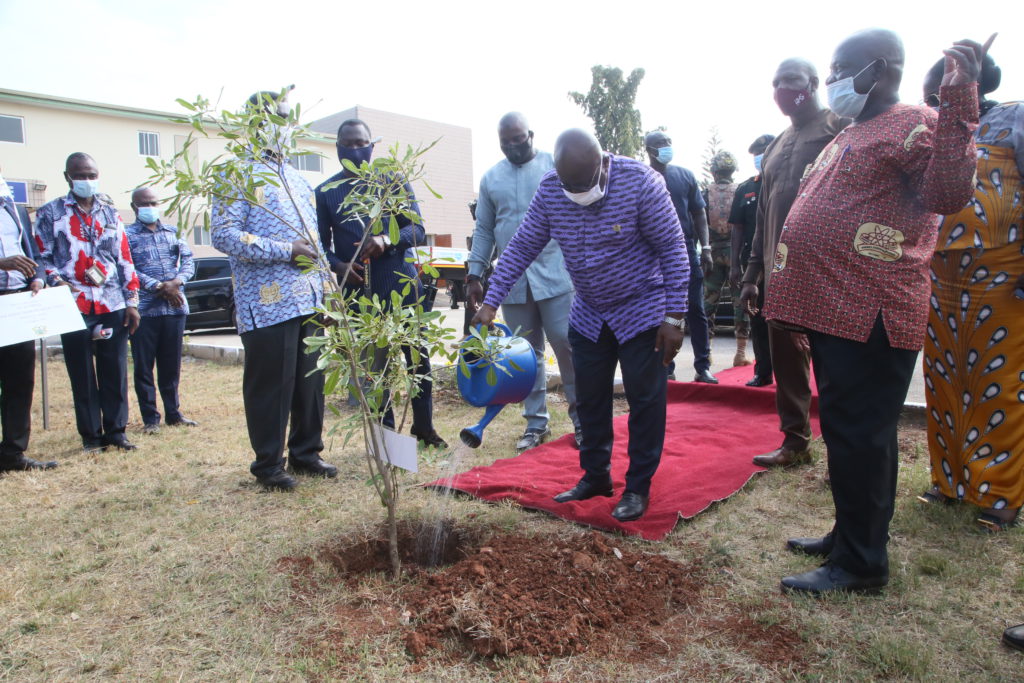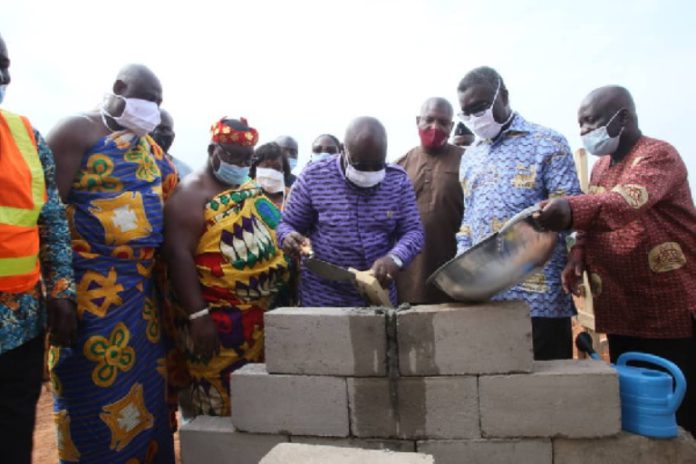The President, Nana Akufo-Addo, has cut the sod for the construction of Ghana’s first modern foundry and machine tooling centre, which will produce agro-processing machines and equipment, farming implements, and spare parts for maintenance and repairs.
Cutting the sod for the commencement of construction on Monday, 31st August, President Akufo-Addo explained that, once completed, the facilities at the Centre will provide technical support for policy initiatives of Government such as “One District, One Factory”, which is already in place in many districts across the country, and is providing jobs for Ghanaian youth.
“More importantly, the foundry and machine tooling centre will put us in a position to develop and grow the talents of skilled and innovative young Ghanaians, who graduate from our schools, colleges and universities,” he added.
Delivering his remarks at the ceremony, the President explained that the establishment of the Foundry and Machine Tooling Centre is a key component of a much broader strategic framework that is designed to ensure that Ghana’s socio-economic development is driven by Science, Technology and Innovation (STI).
Explaining the rationale for the establishment of the Centre, President Akufo-Addo noted that the structure of economies bequeathed to countries in sub-Saharan Africa by colonialism was aimed at servicing its needs, promoting, essentially, raw material producing and exporting economies, which imported manufactured commodities from the industries of the colonial power.
“Ever since the celebrated British Governor of colonial Gold Coast, Sir Frederick Gordon Guggisberg, left our shores in 1928, Ghana’s economy, like that of many countries on the continent, has generally remained structurally rigid, depending largely on exports of primary commodities such as gold, cocoa, bauxite and timber,” he said.
The President continued, “A major contributory factor to this situation has been the fact that our country imports almost all of the equipment, machinery, and parts that support industry, especially in the manufacturing sector. This has not allowed the manufacturing base of our country to grow and expand, and has, thus, rendered our economy incapable of creating the thousands and thousands of jobs that our young people yearn for, and that will raise their living standards.”

In advocating for a “Ghana Beyond Aid”, President Akufo-Addo told the gathering that Government has decided to pursue the strategy of adding value to our resources, through an accelerated industrialisation strategy that exploits the resources of our nation.
Ghana, he said, is endowed with an abundance of land and good climate for agriculture; a rich supply of mineral and natural resources; a youthful population; we are a strong democracy and politically stable country; and we are now the headquarters of the African Continental Free Trade Area (AfCTA), with a market of some 1.2 billion people, targeted to reach 2.5 billion by 2050.
All these factors, according to the President, position Ghana to become a potential business and industrial hub, producing and exporting manufactured goods and modern services to the rest of Africa, Europe, the Americas, Asia and beyond.
“This is the basis and the foundation for our National Strategy for Industrialisation, and the foundation stone we are laying today is a cornerstone of this industrialisation strategy,” he said.
The Minister of Environment, Science and Technology, Professor Kwabena Frimpong Boateng said the foundries is the beginning of the journey towards tools industrialisation in Ghana.
The Minister noted that the project is expected to be completed within a space of nine (9) months. He further indicated the construction of the foundry and machine tooling centre is an important but difficult and complex journey.
“I am aware that this is the beginning of the journey towards true industrialization of the country, there is no turning back. This is a disruptive undertaking that will change this country forever” Professor Frimpong-Boateng said.
The project is expected to be completed within nine months and help the country to importation of some of the industrial tools.
The Director General of the Ghana Atomic Energy Commission, Professor Benjamin J. B. Nyarko in his welcome address praised President Akufo-Addo as being the first Head of State since 1976 and the first President of the fourth (4th) Republic to visit Ghana Atomic Energy Commission facilities twice within two (2) years.
He further stated that foundry technology the world over has proven to be important in developed countries and will therefore be very crucial in Ghana’s efforts to develop it manufacturing industry, and thus, expand the economy.
The manufacturing industry relies heavily on computer-numerical control (CNC) machining, Including operations that use engineer – operated equipment such as routers, shaping machines, vertical millers and center lathes.
CNC manufacturing process which utilises computerised controls to operate and laminate machine and cutting tools to shape stock material such as, metal, plastic, wood, foam, composite, into custom parts and designs.
Foundries are established to make metal castings possible This is essential in metal working where castings are produced by pouring liquid metal into a mould, which contains a hollow cavity of the desired shape, and then allowing it to cool and solidify.
The solidified part known as a casting is ejected or broken out of the mould to complete the process.


